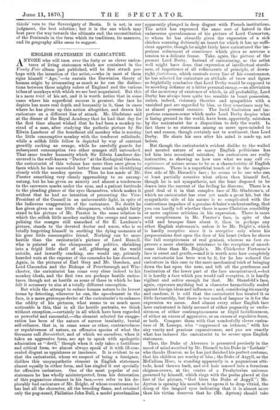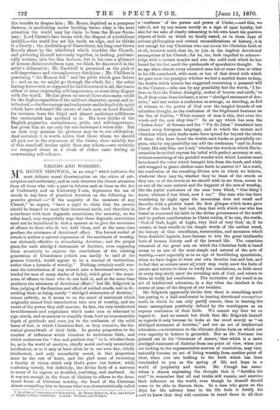ENGLISH STATESMEN IN CARICATURE.
ANYONE who will turn over the forty or so clever carica- tures of living statesmen which are contained in the Vanity Fair album just published, will be first struck per- haps with the intention of the artist,—who in most of them signs himself " Ape,"—to sustain the Darwinian theory of human origin by attenuating as much as he can the distinc- tions between these mighty rulers of England and the various tribes of monkeys with which we are best acquainted. But this is a mere trick, of his art, and it is worth notice that in some cases where his superficial success is greatest, the face he depicts has more real depth and humanity in it, than in cases where he has given up this notion altogether, and drawn his caricature on a different line of attack. Mr. Gladstone said at the dinner of the Royal Academy that he had that day for the first time almost wished that he had been a monkey in- stead of a man, after studying the pathetic picture by Sir Edwin Landseer of the beneficent old monkey who is nursing the little consumptive monkey with the tenderest solicitude, while a selfish little fellow is depicted by way of contrast greedily sucking an orange, while he carefully guards for subsequent consumption two other oranges still untouched. That same tender humanity which Sir Edwin Landseer dis- covered in the well-known " Doctor " at the Zoological Gardens, the caricaturist of this volume has more than once given to faces which he has succeeded better than usual in identifying closely with the monkey species. Thus he has made of Mr. Forster something very closely approaching to an ourang- outang, but he has given an anxiety and almost a tenderness to the careworn marks under the eyes, and a patient fortitude to the pleading glance of the eyes themselves, which makes it evident that he had no intention of presenting the Vice- President of the Council in an unfavourable light, in spite of the ludicrous exaggeration of the caricature. No doubt he has given given us one little chimpanzee, which might fairly stand to his picture of Mr. Forster in the same relation in which the selfish little monkey sucking the orange and mono- polizing the oranges still unsucked of Sir E. Landseer's picture, stands to the devoted doctor and nurse, who is so totally forgetting himself in soothing the dying moments of his poor little consumptive friend. Nothing can be more hostile than the caricaturist's picture of Lord Russell, who is painted as the chimpanzee of politics, shrinking into a frigid little shell of self, gibbering at the world outside, and inwardly cracking, one would say, privately hoarded nuts at the expense of the comrades he has disowned. Again, in the pictures of Earl Grey and Mr. Goschen, and Lord Clarendon and the Bishops of Peterborough and Win- chester, the caricaturist has come very close indeed to his monkey ideals, and the first two are perhaps hostile carica- tures, though not so hostile as some of those in which he has felt it necessary to aim at a totally different conception.
But while the attempt to reduce human nature to its lowest terms by detecting, wherever he can, the ape-element in the face, is a mere grotesque device of the caricaturist's to enhance the oddity of his pictures, what seems to us much more noticeable is this, that in all the hostile portraits, we think without exception,—certainly in all which have been regarded as powerful and successful,—the element selected for exagge- ration has been of the nature of narrow insularity, brutal self-reliance, that is, in some sense or other, contractedness
or repulsiveness of nature, an offensive species of what the Germans call Bornirtheit, and of which we ourselves, when it
takes an aggressive form, are apt to speak with apologetic admiration as "devil," though when it only takes a fastidious and critical form, we almost always speak of it with ill-con- cealed disgust as uppishness or insolence. It is evident to us that the caricaturist, whom we suspect of being a foreigner, dislikes this unsympathetic element in English statesmen almost equally in either form, and has singled it out specially for offensive caricature. One of the most popular of our statesmen he has wholly misinterpreted, from his detestation of this pugnacious element in his face,—we refer to his de- plorably bad caricature of Mr. Bright, of whose countenance he has lost all the character, all the brooding flame, and retained only the pug-nosed, Philistine John Bull, a model paterfamilias
apparently plunged in deep disgust with French institutions. The artist has expressed the same sort of hatred in the cadaverous querulousness of his picture of Lord Carnarvon, to whom he has absurdly given the expression of a sick chicken scanning dubiously an insect for which it has Ito suffi- cient appetite, though he might fairly have caricatured the im- perious refinement of conscience which gives so nervous a tension to a delicate frame. Take, again, the picture of the present Lord Derby. Instead of caricaturing, as the artist well might have done, that expression of intellectual sturdi- ness, of impatience of all refinements of principle, of down- right factishness, which controls every line of his countenance, he has selected for caricature an attitude of brow and figure so frightfully combative that Lord Derby would be supposed to be scowling defiance at a bitter personal enemy,—an alleviation of the monotony of existence of which, in all probability, Lord Derby has always been quite too sensible to boast possession, unless, indeed, visionary theories and sympathies with a vanished past are regarded by him, as they sometimes may be, as almost personal enemies. The lucid limitation and im- perious common-sense which make Lord Derby despise what is losing ground in the world, have been, apparently, mistaken by the caricaturist for a disposition to defy the world. In fact there is no statesman among us more open-minded to fact and reason, though certainly not to sentiment, than Lord Derby. He shuts his ears after his mind is made up, not before.
But though the caricaturist's evident dislike to the walled and moated nature of so many English politicians has led him into occasional mistakes, his caricatures are really instructive, as showing us how rare what we may call re- ceptiveness of nature seems to be as a characteristic of English statesmen. There is a superficial touch of it in the imagina- tive side of Mr. Disraeli's face ; he seems to be one who can at least partially conceive what others than himself feel, though he is not sympathetic, not the least disposed to be drawn into the current of the feeling he discerns. There is a good deal of it in that complex face of Mr. Gladstone's, of which no caricaturist has ever yet made a great hit, but the sympathetic aide of his nature is so complicated with the contentious impulses of a genuine debater's understanding, that you can hardly tell whether there is more Christian sensibility or more captious criticism in his expression. There is more real receptiveness in Mr. Forster's face, in spite of the wild and brusque lines about it, than in perhaps any other English statesman's, unless it be Mr. Bright's, which is hardly receptive since it is receptive only where his prepossessions first open the door of his heart (when he shows the full receptiveness of real genius), whereas no face ex- presses a more obstinate resistance to the reception of unwel- come ideas than Mr. Bright's. Mr. Chichester Fortescue's face is sweet and gentle,—and it is worth note how completely our caricaturist has been won by it, for he has reduced the caricature in this case to the mere mechanical trick of bringing down the hat upon the nose, and left all the gentleness and fascination of the lower part of the face uncaricatured,—but it is hardly a face which you would call receptive, it is hardly vigilant and active enough for that. Mr. Stansfeld's face, again, expresses anything but a character hermetically sealed against foreign ideas and influences ; and, considering its suavity and candour, it is odd that the caricaturist has treated it so little favourably, but there is too much of languor in it for the expression we mean. And almost every other English face here caricatured is fairly accused of either pugnacity or exclu-
siveness, of either contemptuousness or frigid fastidiousness, of either an excess of aggressive, or an excess of repulsive force, or both. Compare them with that wonderfully clever carica- ture of M. Lesseps, who " suppressed an isthmus," with his airy vanity and gracious expansiveness, and you see exactly what has induced the caricaturist to be severe upon English statesmen.
Thus, the Duke of Abercorn is presented precisely in the mood of mind ascribed by Mr. Disraeli to his Duke in "Lothair " who thanks Heaven, as he has just finished his perfect costume, that his children are worthy of him ; the Duke of Argyll, as the McCallum More, is standing apparently in a pugnacious atti- tude, head thrown back, and red hair massed into a ferocious chignon-crown, at the centre of a Presbyterian universe governed by himself, which rings with the psalm placed at the foot of the picture, " God bless the Duke of Argyll "; Mr. Ayrton is opening his mouth as he opens it to drop vitriol, the droop of the languid eyes indicating that it is almost more than his victim deserves that he (Mr. Ayrton) should take
the trouble to despise him ; Mr. Bruce, depicted as a pompous Sawney, is meditating under beetling brows what is the next attention the world may lay claim to from the Home- Secre- tary ; Lord Cairns's face teems with the disgust of a fastidious invalid,-.—the world has set his teeth on edge, and he thinks it a liberty; the Archbishop of Canterbury, his long coat blown fiercely about by the whirlwind which troubles the Church, and gathering himself nervously together, is looking, puritani- cally anxious, into the dim horizon, but in his case a glimmer of human disinterestedness may, we think, be discovered in the artist's delineation ; Mr. Cardwell is presented as the pink of self-importance and circumlocutory dandyism ; Mr. Childers is practising " the Roman fall " and the pride which goes before it ; and so on, we might go through the whole list ; the artist having discovered, or supposed he had discovered in all, the traces either of some engrossing self-importance, or some deep disgust with the world. He has given no one of these statesmen credit for the higher capacities of the militant character, moral and in- tellectual,—forthecourage and endurance andindomitable spirit which have redeemed the nature of such men as Lord Russell, for instance, from the frigid and almost malicious selfishness the caricaturist has ascribed to it. His keen dislike of the English pugnacity, exclusiveness, pride, and self-importance, has given him an eye only for our statesmen's worse side. But on that very account his pictures may be to our edification. And certainly it is worth notice that those whom we should all pick out as the statesmen of the future, show notably less of this stand-off insular spirit than any others,—are certainly not wrapped about in a cloak of either caste feeling or overweening self-reliance.































 Previous page
Previous page